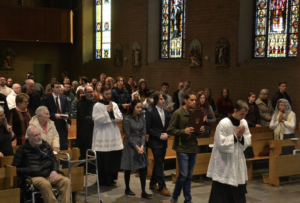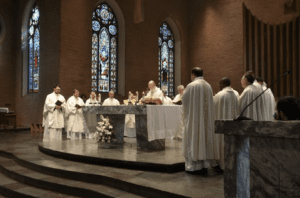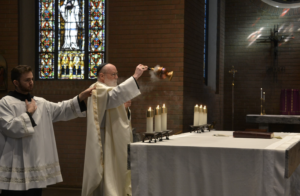2023 Feast of St. Benedict
March 21 is the traditional date for the death of St. Benedict. In the proper liturgical calendar of our Congregation of monasteries, March 21 is the major feast for St. Benedict each year. St. Benedict’s Day has traditionally been a holiday for the college. The monks invite the bishop and clergy of the diocese, as well as the Sisters of Mercy from Sacred Heart Convent, to join them for Mass on this day. This year, a number of priests from the diocese and Sisters of Mercy from Sacred Heart were present, along with Dr. & Mrs. Thierfelder, members of the Board of Trustees of the college, as well as students, faculty, staff and administrators. A luncheon followed the celebration. In the evening, the monastic community hosted the first year students from the St. Joseph College Seminary for Vespers, supper and Compline.



*Photos courtesy of John Jacob
Full Homily Text
Saint Benedict’s Day March 21, 2023
We have gathered today to give thanks to God for the life and teaching of Saint Benedict. For us, the monks, who believe God has called us to take up the way of life Saint Benedict left for us in his Rule, it is a day of special thanksgiving. In celebrating the feasts of the saints, however, we are truly thankful to the extent that we strive to profit from the example of these men and women, filled with God’s grace. This is, for us monks, especially true in the celebration of Saint Benedict, for he has left us a pattern of his life which we strive to make our own. As the life of Saint Benedict recounted in the Dialogues of Saint Gregory the Great tells us, “He wrote a Rule for monks that is remarkable for its discretion and its clarity of language. Anyone who wishes to know more about his life and character can discover in his Rile exactly what he was like as an abbot, for his life could not have differed from his teaching (Dial. II.36)”.
It is, then, from Saint Benedict’s teaching that we can find the example which had brought him to that holiness of life for which we long. At the conclusion of his Rule, where he cautions us that what he has composed is just “a little rule for beginners”, he teaches us “what page, what passage of the books of the Old and New Testaments is not the truest of guides for human life (RB 73.3)?” Indeed, the foundations for the life in Christ outlined in the Rule are the sacred Scriptures and the mystery of God’s saving love as celebrated in the church’s liturgy. We can, therefore, turn today to the liturgy and our instruction by God’s word to find direction for our celebration today.
Today’s gospel passage follows directly after Jesus invitation to the rich young man to sell all that he has and give it to the poor and to come follow him. The young man, as we know, turned away sadly and left, and Jesus warned against placing all our security in our possessions. Astonished by Jesus’ warning that those who seemingly possess all the advantages of wealth and prosperity will find it difficult to enter the Kingdom of God, the disciples ask, Who then can be saved (Mt. 19:25)? Peter anxiously adds, as we have just heard, We have given up everything and followed you. What will there be for us (Mt. 19:27)? The Lord gently turns Peter’s attention away from concern with what he does not have, to promise him what he will inherit, namely eternal life (Mt.19:29).
In a world focused on power and self-will, material comfort, self-absorbed consumerism, and celebrity status, it is well that we are reminded that the one, truly lasting good is eternal life, which God in his mercy has bestowed on us as our inheritance by baptism into the dying and rising of Our Lord Jesus Christ.
Thus, at the very beginning of the Prologue, in his own words, Saint Benedict famously urgers us to “Listen!” We are to listen to those instructions whereby “the labor of obedience will bring you back to him from whom you had drifted through the sloth of disobedience (Prol. 2).” He urges us “to give up your self-will, once and for all, and armed with the strong and noble weapons of obedience to do battle for the true King, Christ the Lord. (Prol. 3). Indeed, as the Letter to the Ephesians has just admonished us this morning, we must draw your strength from the Lord and from his mighty power, because our struggle is not with flesh and blood but with the principalities, with the powers, with the world rulers of this present darkness, with the evil spirits in the heavens (Eph. 6:12). Thus Saint Benedict prescribes obedience as his principal virtue, by which we are to conquer the sinful inclinations of our self-will, and conform our wills to God’s will, who wishes all to be saved and to come to a knowledge of Himself.
Among the Instruments of Good Works, therefore, Saint Benedict urges us to “yearn for everlasting life with holy desire (RB 4.46).” As his sole criterion for discernment of an authentic call to the monastic life by a candidate who presents himself at the monastery, he states simply, “Does he truly seek God?” If we truly seek God, then by God’s own gift we will receive Jesus’ promise in today’s gospel, we will inherit eternal life. For God is that inheritance; He Himself it is who is eternal life; a life which is dynamic living charity in that communion of Father, Son and Holy Spirit. It is this life for which we were created and yet more wondrously redeemed by the Incarnation, death and glorious resurrection of the Son of God, Jesus Christ Our Lord.
So often, I fear, in our striving with those principalities and powers, with our own sinfulness, with the evils of the world, we can lose sight of the fact that it is all God’s work; God who has triumphed once and for all in the resurrection of Jesus Christ. It is telling that Saint Benedict, after having listed throughout the entire fourth chapter of his Rule all the instruments of good works, all the things we are to strive to accomplish, he ends his list with the most significant of all these works, namely, “never to despair of God’s mercy”. Ultimately, our salvation is all God’s work. All we can do is, with the help of God’s grace, prepare an opening in our lives for God’s grace to take root and flourish. Perhaps the most significant gift of Saint Benedict to the church is this way of life which the Providence of God has continued unbroken in the church since Saint Benedict’s day. It is a way of life which seeks to keep us focused on God and His mercy; and thus serves as a reminder to the larger church community of that focus which each must maintain in one’s given vocation. This way of life witnesses to the truth that God’s grace can, with time and patient effort, transform us sinners and lead us to a holier life. It is the witness that Saint Benedict describes in the penultimate chapter of the Rule, where he instructs the monks to be the first to show respect to the other, to pursue what is better for someone else rather than for oneself, earnestly to compete in obedience to one another and to support with the greatest patience one another’s weaknesses of body or character, to prefer nothing whatsoever to Christ. It is this witness to the slow yet certain working of God’s love that can model the variety of characters that is the community into something which begins to approach the wondrous unity in diversity of the blessed Trinity, which can make the monastery a home of peace, and which prepares us into the inheritance of eternal life.
To some extent, this story of turning away from sacrifice and difficulty to focus on eternal life mirrors the history of this abbey. When the monks arrived in North Carolina, there was no organized diocese and the monastery was in the least Catholic state in the country. The monks were called to go out and engage in the pastoral care of Catholics in the state, and struggled to maintain the school in a region where there was little financial support. Together with those who preceded us in North Carolina, the Sisters of Mercy, who are the true foundation stones for the current flourishing of the Catholic Church in North Carolina, the monks worked hard to build up the church in this state. As the territory under the care of the abbey was reduced, not always happily, we were instructed to focus on Catholic education and the witness of our monastic life. We therefore offer our Catholic college, which hands on the beauty of the Catholic intellectual tradition with its conviction that we are made to seek Truth through our ability to know by reason and by revelation. This Truth also establishes an order of right in wrong, built into the nature of things by the Creator; and order we discover and do not invent, and to which we must conform ourselves if we are to be happy. Rather than going out for pastoral work now, we seek to build up the Church in North Carolina by offering hospitality especially to priests, deacons, seminarians and consecrated religious so that they can have a place of peace to pray and to rest. We want you, our brother priests, to know that you are always welcome, and hope you will come to find some time for quiet with us, that, all together, we may continue to witness to the Lordship of Jesus Christ.